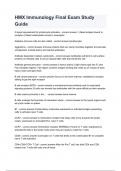Hmx immunology final exam Study guides, Class notes & Summaries
Looking for the best study guides, study notes and summaries about Hmx immunology final exam? On this page you'll find 173 study documents about Hmx immunology final exam.
Page 4 out of 173 results
Sort by
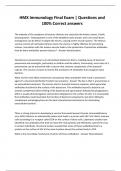
-
HMX Immunology Final Exam | Questions and 100% Correct answers
- Exam (elaborations) • 31 pages • 2024
- Available in package deal
-
- $12.49
- + learn more
The majority of the symptoms of tetanus infection are caused by the tetanus toxins, chiefly tetanospasmin. Tetanospasmin is one of the deadliest toxins known; even very small doses (nanograms) can be lethal. It targets the nerves, causing severe muscle spasms. The tetanus vaccine consists of inactivated tetanus toxin; the vaccine is highly effective for preventing tetanus. Inoculation with the tetanus vaccine leads to the production of protective antibodies. How do these antibodies prevent ...
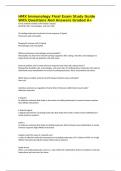
-
HMX Immunology Final Exam Study Guide With Questions And Answers Graded A+
- Exam (elaborations) • 14 pages • 2024
-
- $11.09
- + learn more
HMX Immunology Final Exam Study Guide With Questions And Answers Graded A+ Tissue resident sentinel cells include (3 types) Dendritic cells, macrophages, and mast cells Circulating leukocytes involved in innate response (2 types) Monocytes and neutrophils Phagocytic immune cells (2 types) Macrophages and neutrophils Difference between macrophages and neutrophils? Neutrophils are short lived and will undergo apoptosis after eating a microbe; macrophages are longer-lived and wi...
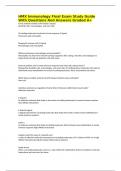
-
HMX Immunology Final Exam Study Guide With Questions And Answers Graded A+
- Exam (elaborations) • 14 pages • 2024
-
- $11.50
- + learn more
HMX Immunology Final Exam Study Guide With Questions And Answers Graded A+ Tissue resident sentinel cells include (3 types) Dendritic cells, macrophages, and mast cells Circulating leukocytes involved in innate response (2 types) Monocytes and neutrophils Phagocytic immune cells (2 types) Macrophages and neutrophils Difference between macrophages and neutrophils? Neutrophils are short lived and will undergo apoptosis after eating a microbe; macrophages are longer-lived and wi...
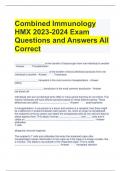
-
HMX Immunology Final Exam Questions with All Correct Answers
- Exam (elaborations) • 100 pages • 2023
- Available in package deal
-
- $13.49
- + learn more
HMX Immunology Final Exam Questions with All Correct Answers One of the most important advances in surgery arrived near the end of the nineteenth century. The British surgeon Joseph Lister hypothesized that using techniques to sterilize surgical tools and clean the skin at the site of the incision would reduce surgical site infections. Years later, Dr. Lister wrote this: "Nothing was formerly more striking in surgical experience than the difference in the behavior of injuries according to wh...
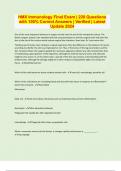
-
HMX Immunology Final Exam | 220 Questions with 100% Correct Answers | Verified | Latest Update 2024
- Exam (elaborations) • 28 pages • 2024
- Available in package deal
-
- $13.49
- + learn more
One of the most important advances in surgery arrived near the end of the nineteenth century. The British surgeon Joseph Lister hypothesized that using techniques to sterilize surgical tools and clean the skin at the site of the incision would reduce surgical site infections. Years later, Dr. Lister wrote this: "Nothing was formerly more striking in surgical experience than the difference in the behavior of injuries according to whether the skin was implicated or not. Thus, if the bones of ...
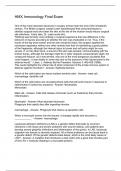
-
HMX Immunology Final Exam
- Exam (elaborations) • 23 pages • 2023
- Available in package deal
-
- $12.49
- + learn more
One of the most important advances in surgery arrived near the end of the nineteenth century. The British surgeon Joseph Lister hypothesized that using techniques to sterilize surgical tools and clean the skin at the site of the incision would reduce surgical site infections. Years later, Dr. Lister wrote this: "Nothing was formerly more striking in surgical experience than the difference in the behavior of injuries according to whether the skin was implicated or not. Thus, if the bones of the...
HMX Immunology Final Exam Study Guide Questions and and answers
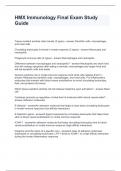
-
HMX Immunology Final Exam Study Guide Questions and Answers 2024
- Exam (elaborations) • 12 pages • 2024
- Available in package deal
-
- $14.49
- + learn more
HMX Immunology Final Exam Study Guide
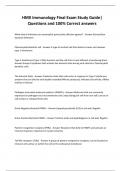
-
HMX Immunology Final Exam Study Guide| Questions and 100% Correct answers
- Exam (elaborations) • 17 pages • 2024
- Available in package deal
-
- $11.99
- + learn more
What kind of infections are neutrophils particularly effective against? - Answer Extracellular bacterial infections Plasmacytoid dendritic cell - Answer A type of sentinel cell that detects viruses and releases type 1 interferons Type 1 Interferons (Type 1 IFNs) function and the cell that is most efficient at producing them - Answer Group of cytokines that activate the antiviral state during viral infection; Plasmacytoid dendritic cells
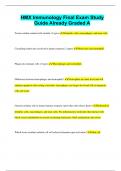
-
HMX Immunology Final Exam Study Guide Already Graded A
- Exam (elaborations) • 27 pages • 2023
-
- $9.99
- + learn more
HMX Immunology Final Exam Study Guide Already Graded A Tissue resident sentinel cells include (3 types) Dendritic cells, macrophages, and mast cells Circulating leukocytes involved in innate response (2 types) Monocytes and neutrophils Phagocytic immune cells (2 types) Macrophages and neutrophils Difference between macrophages and neutrophils? Neutrophils are short lived and will undergo apoptosis after eating a microbe; macrophages are longer-lived and will eat apoptotic cells and waste Ge...

Study stress? For sellers on Stuvia, these are actually golden times. KA-CHING! Earn from your study resources too and start uploading now. Discover all about earning on Stuvia



